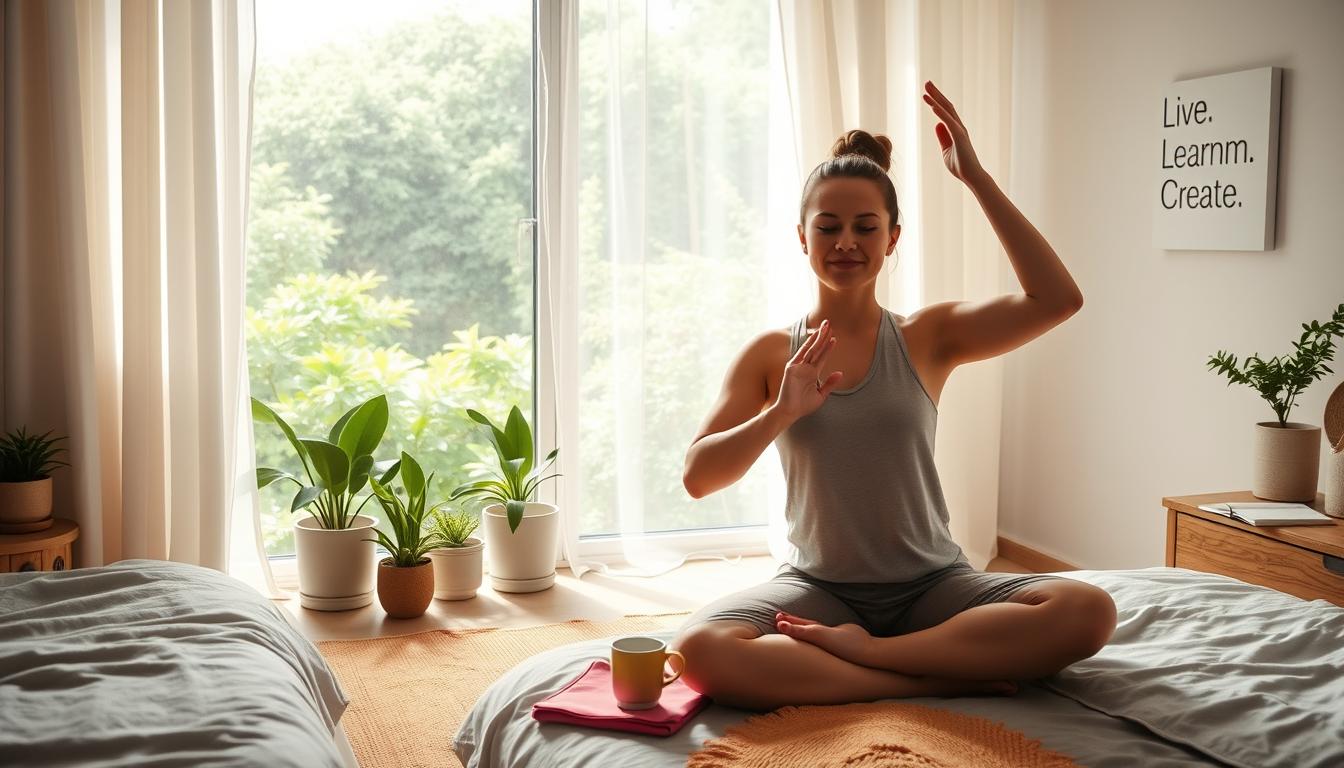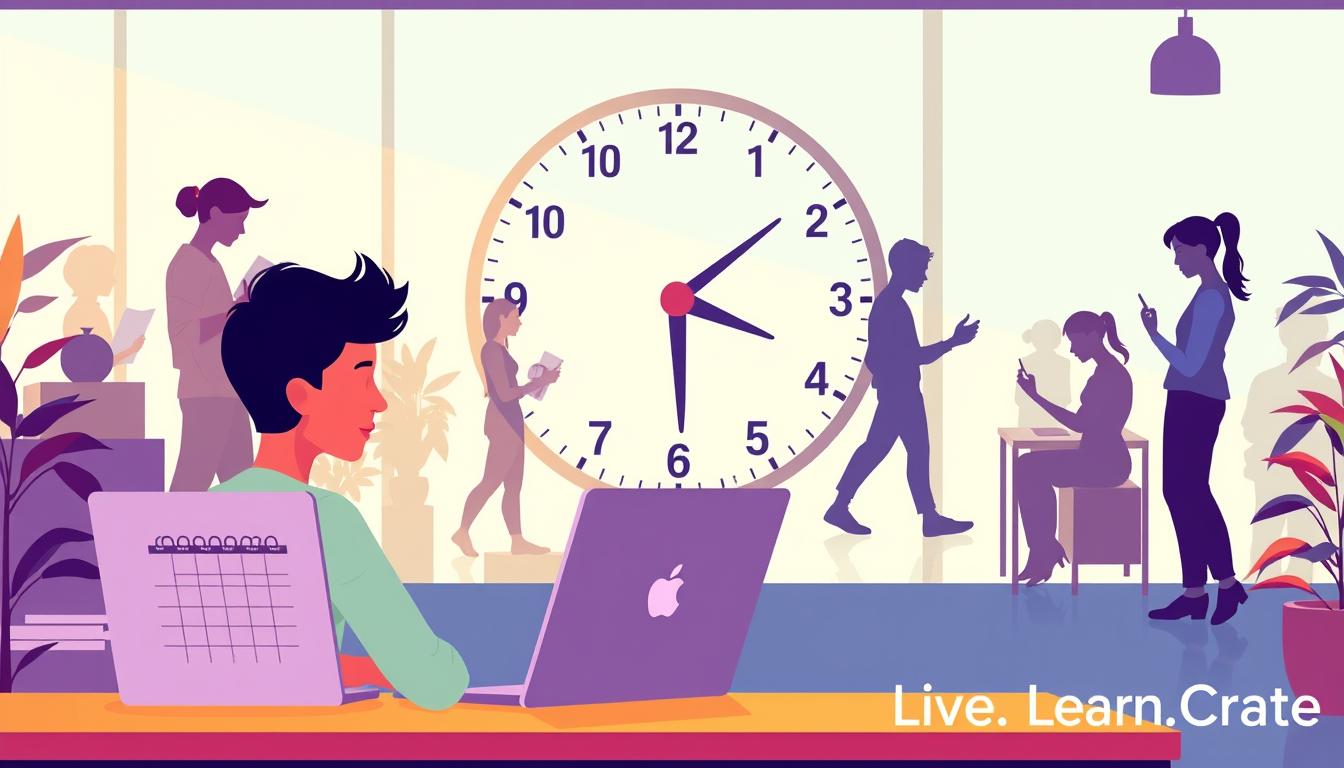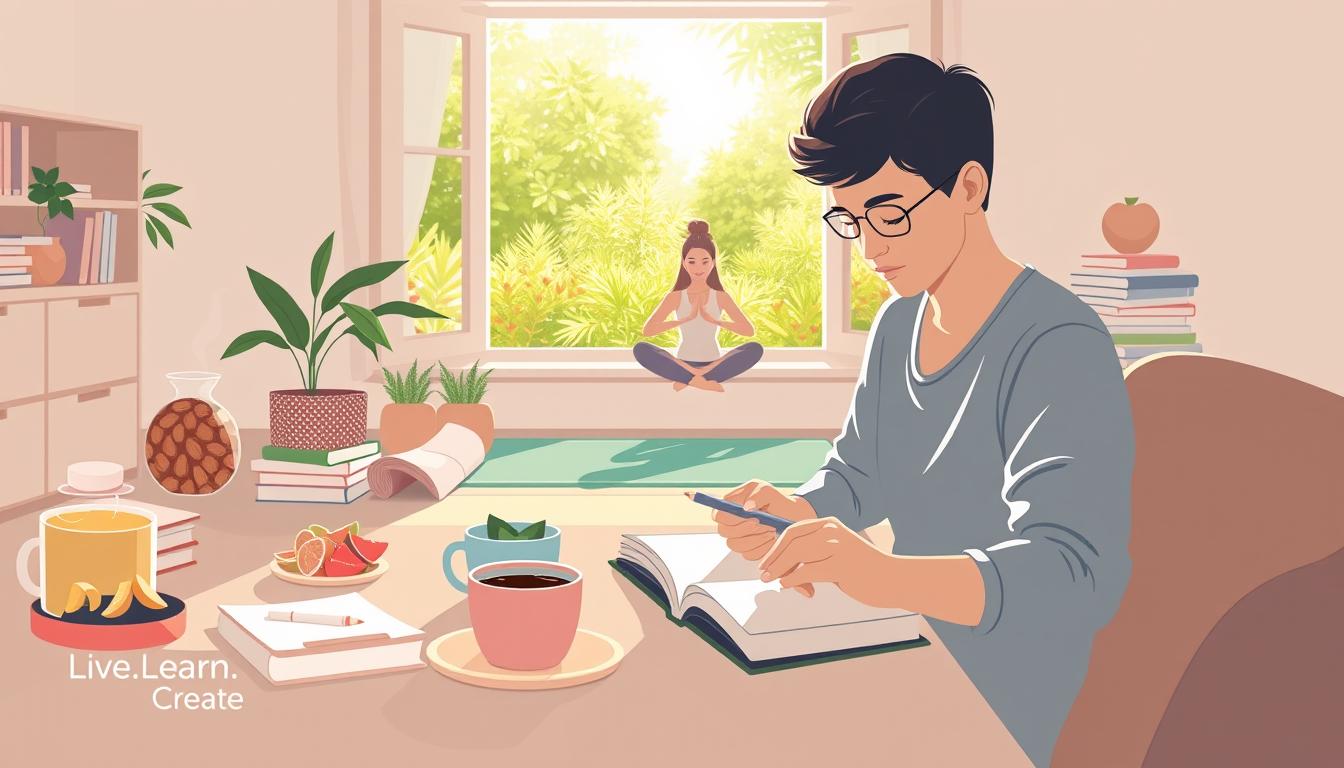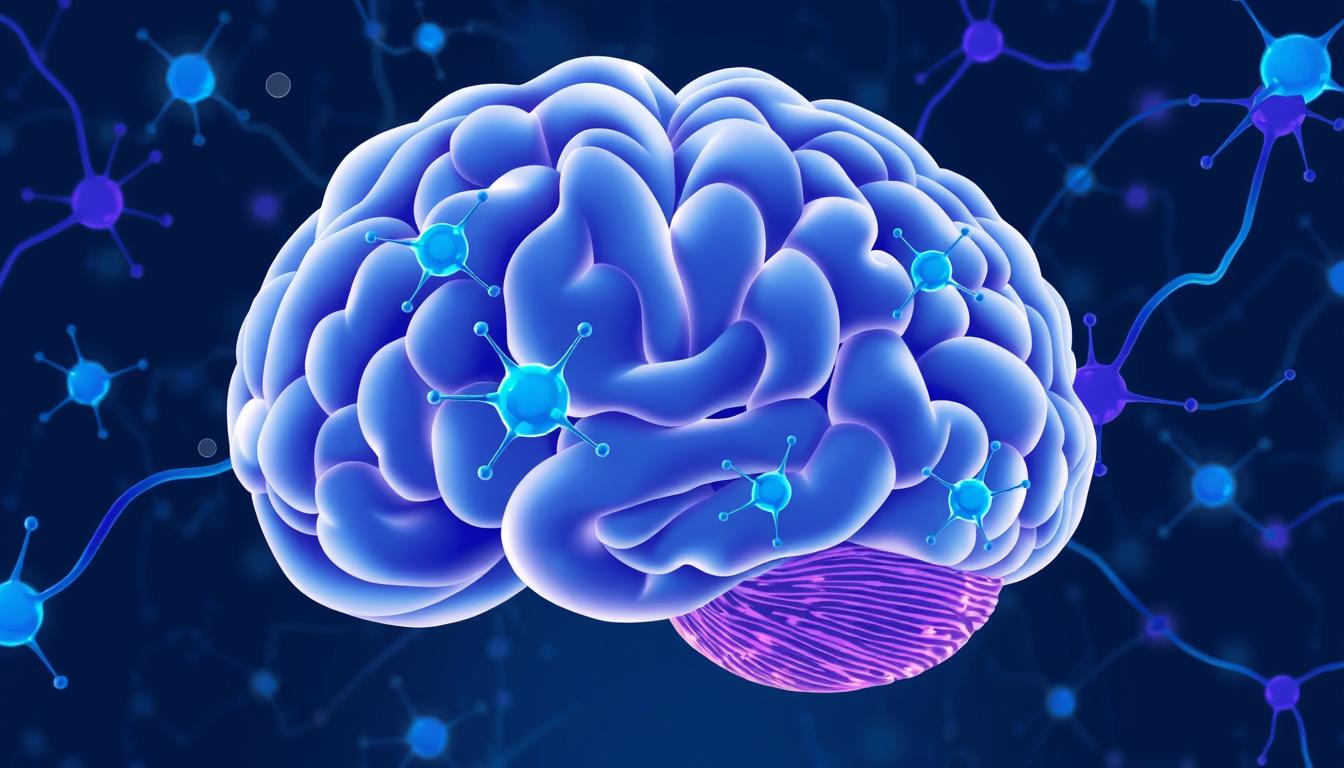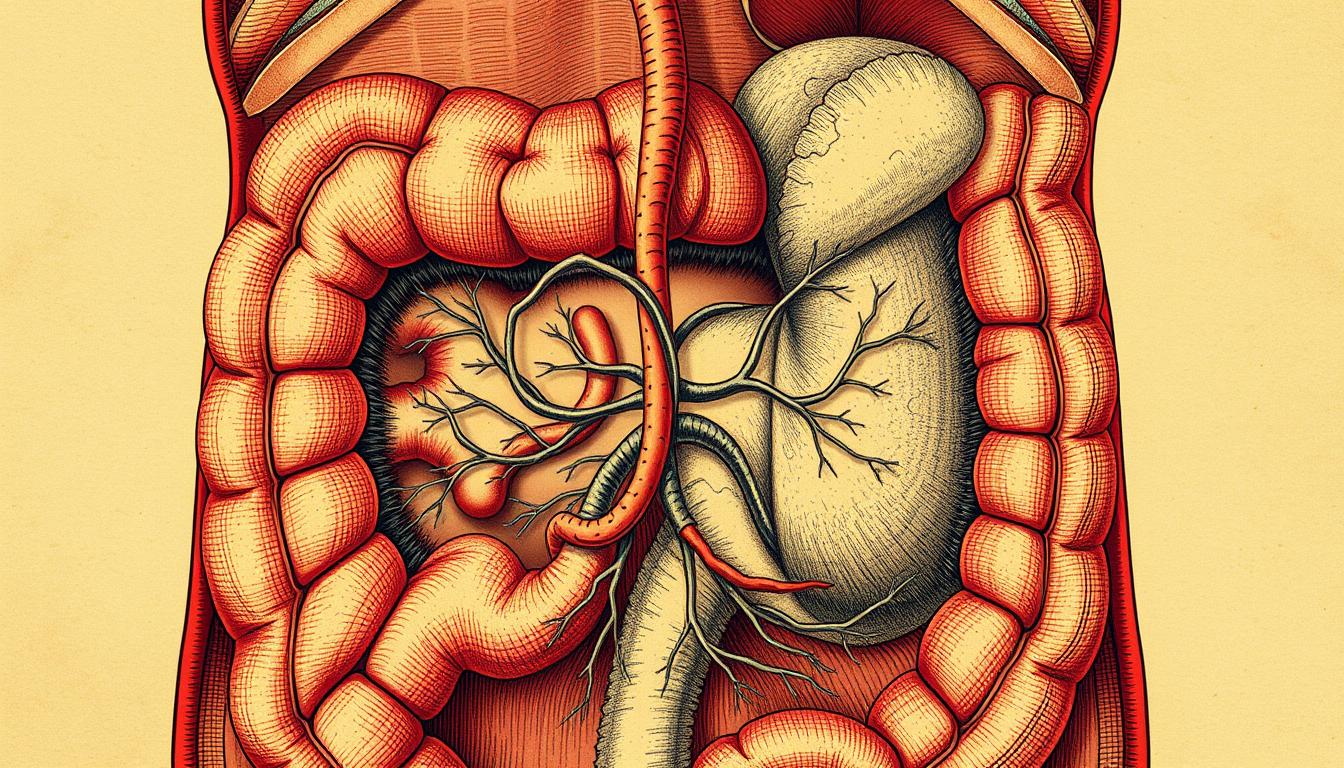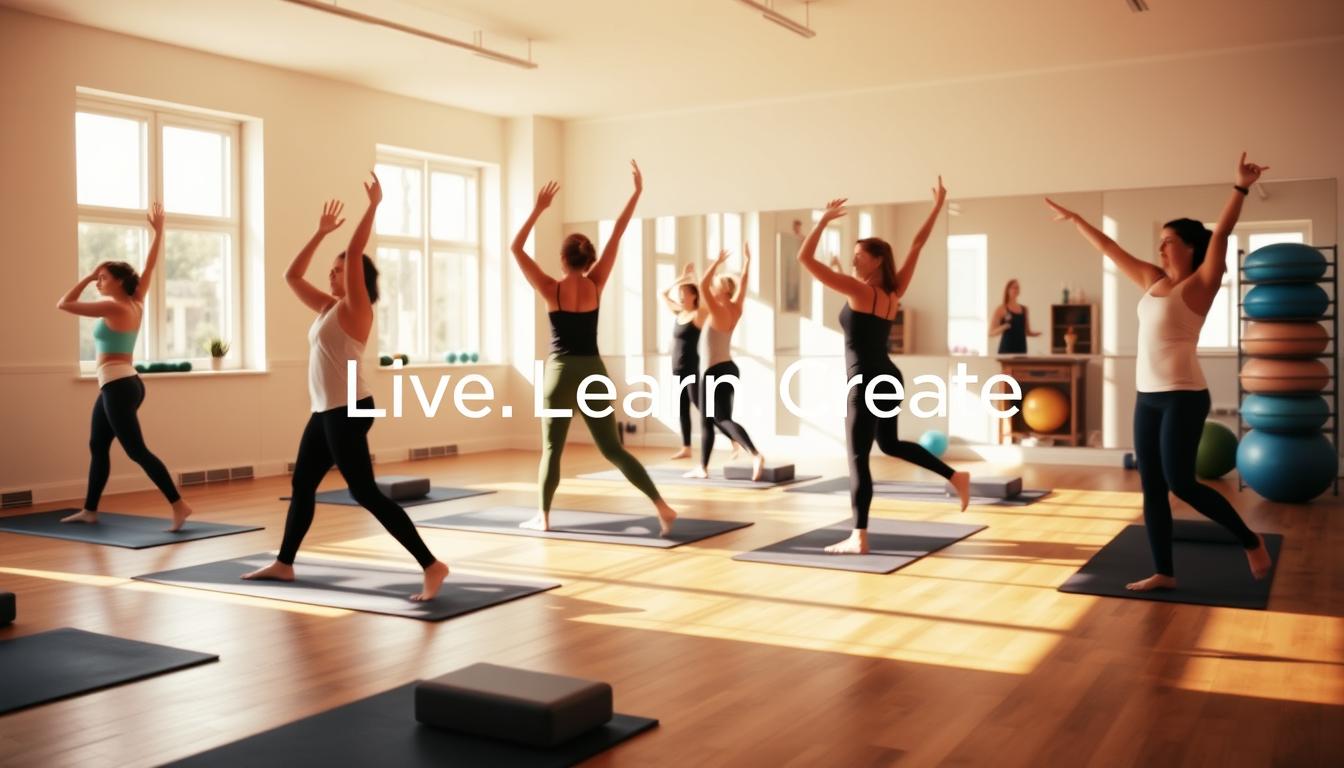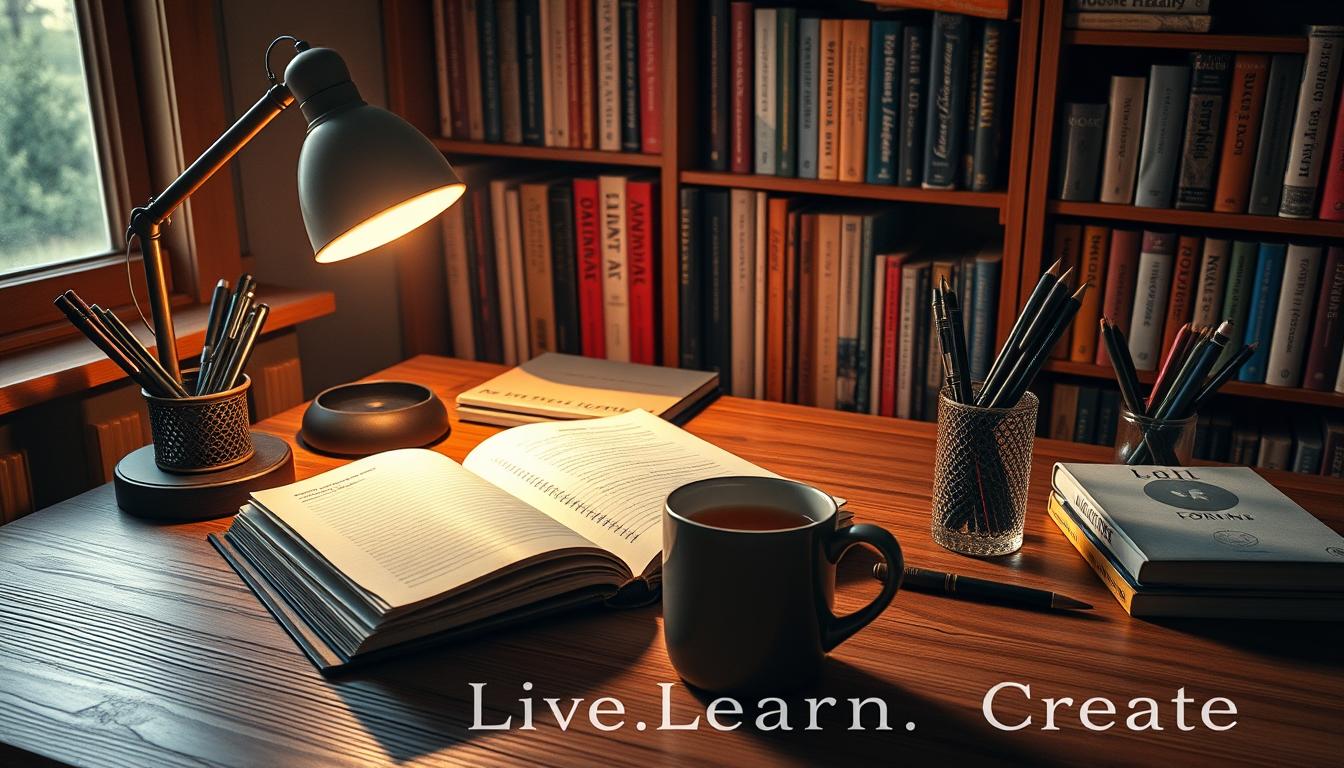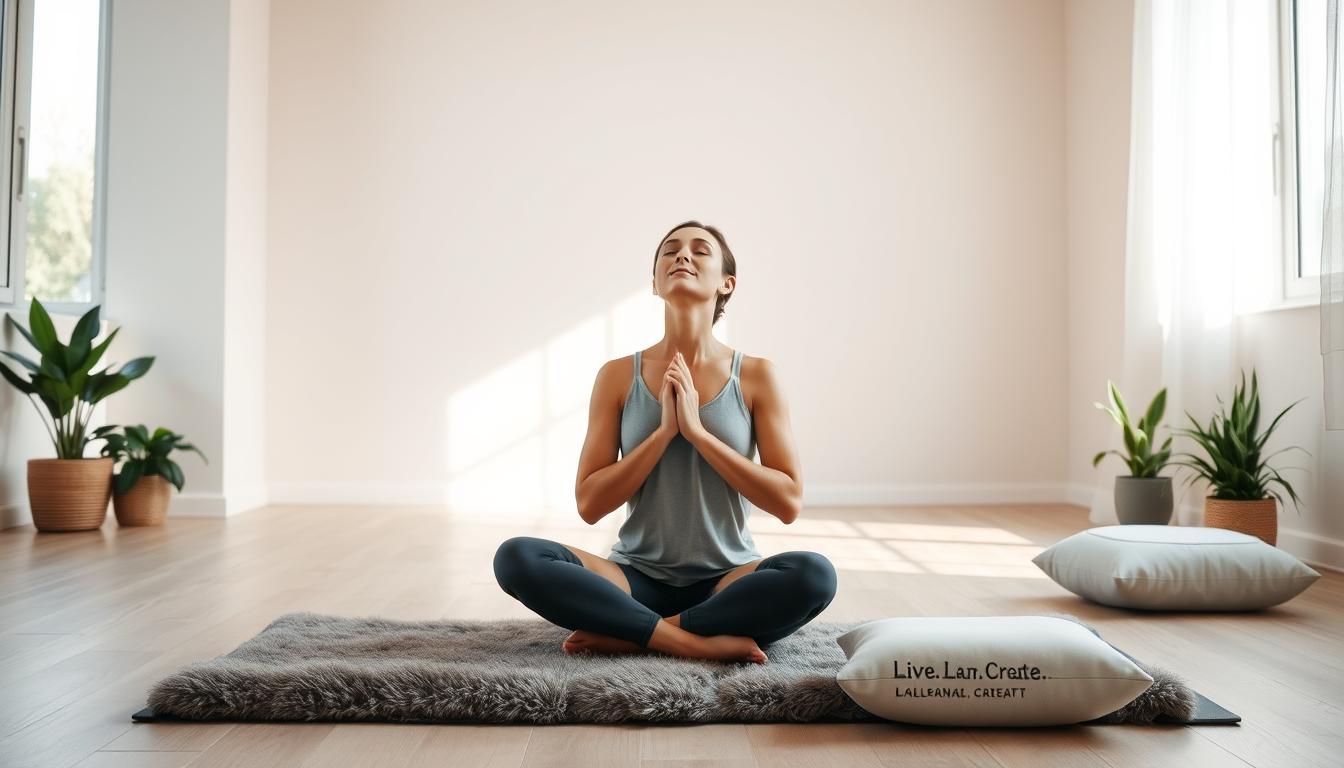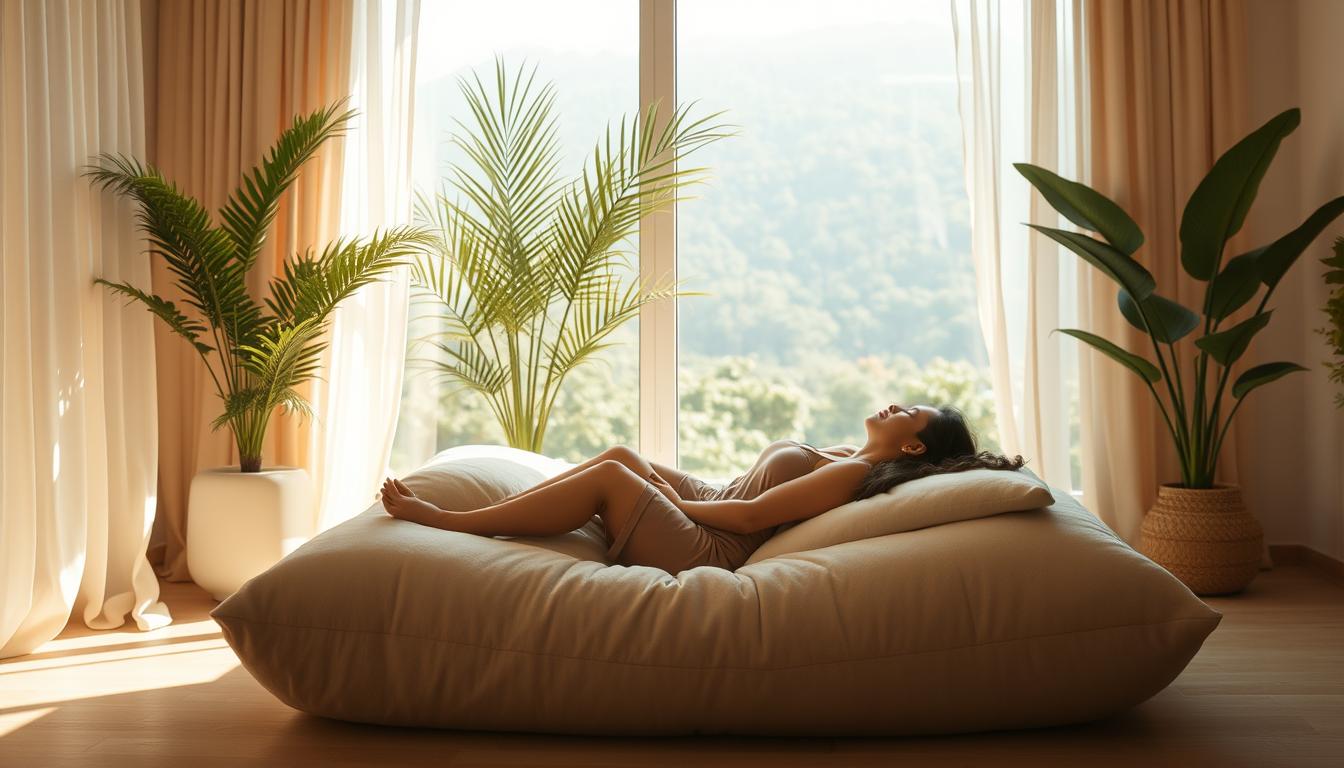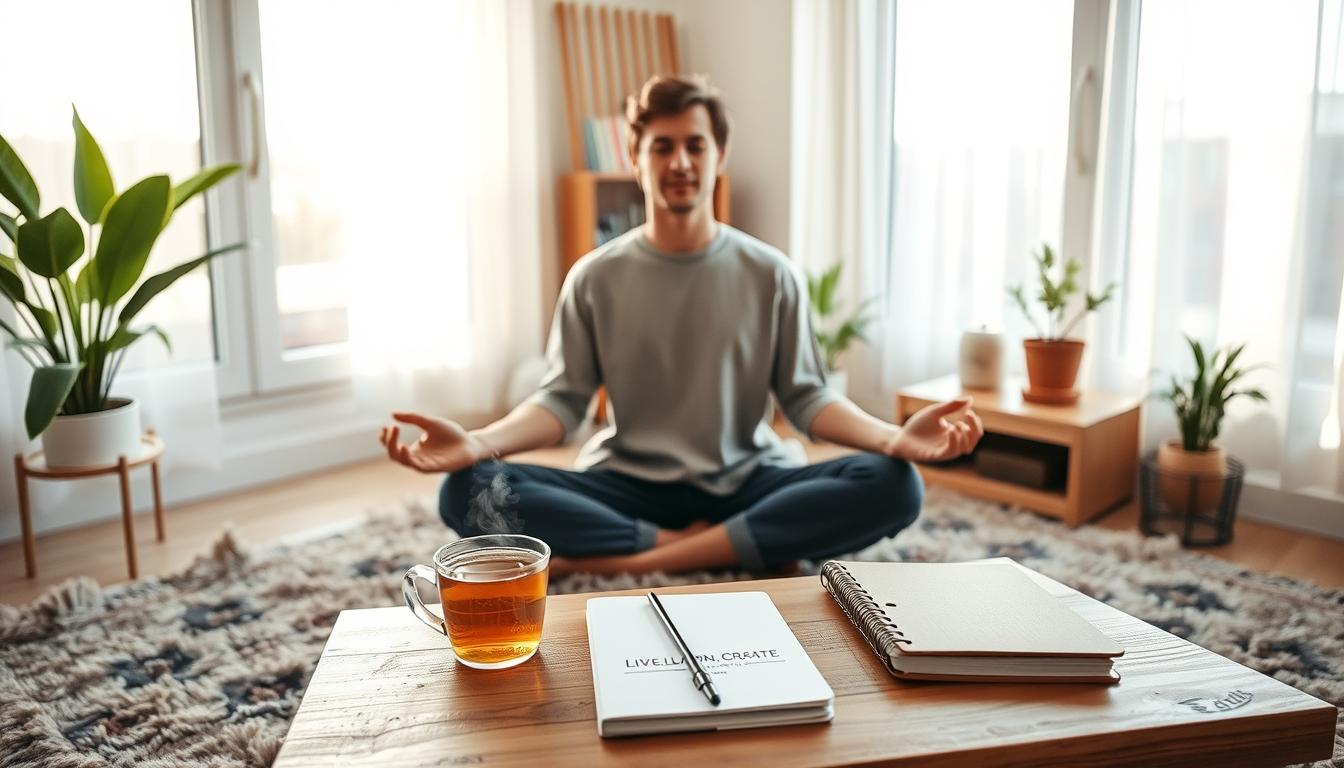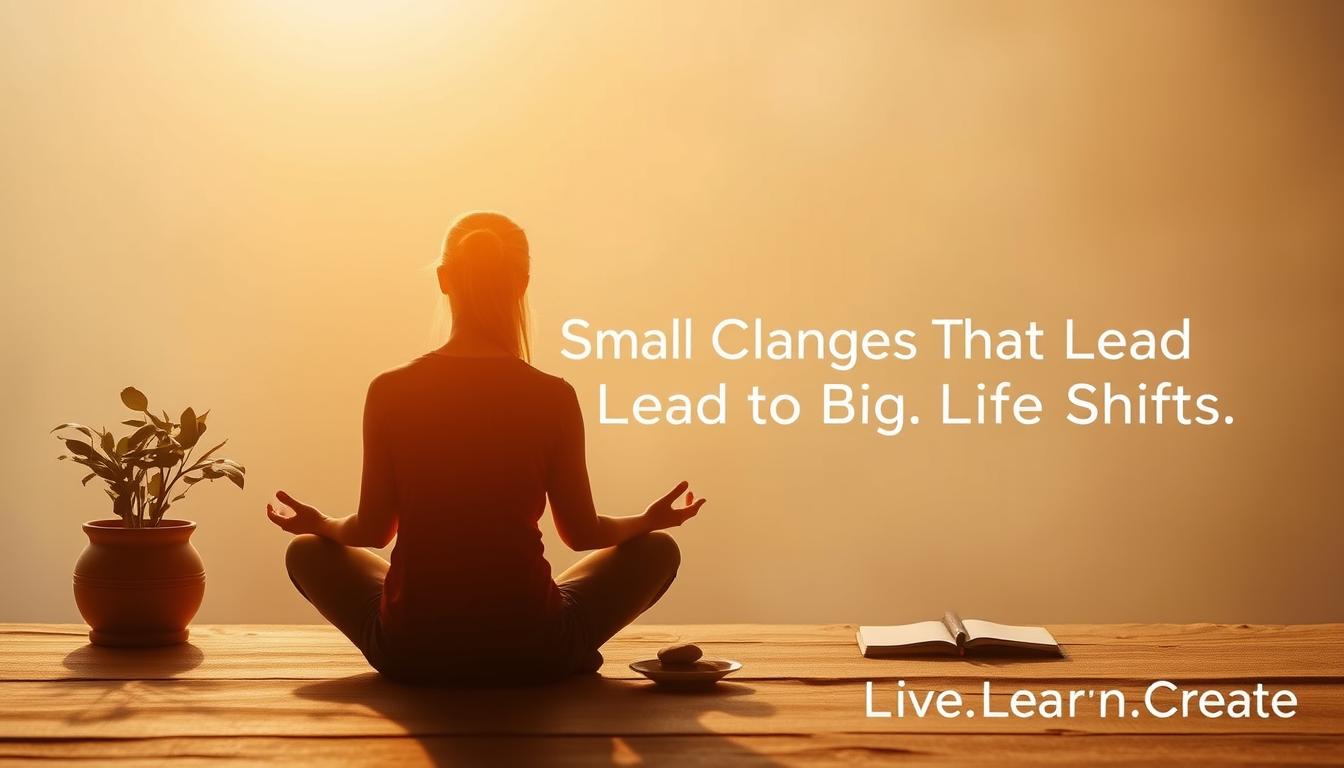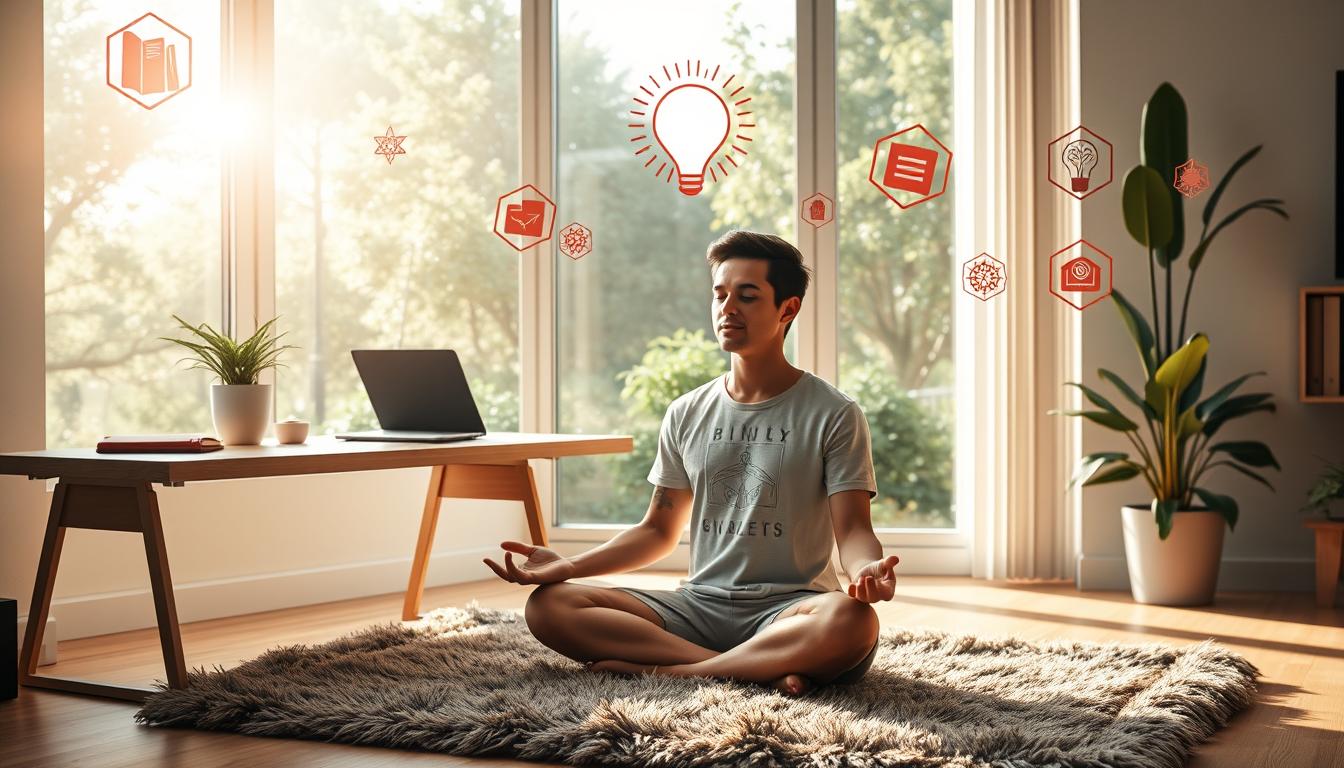Ever wonder why some people start their days with unshakable focus while others feel scattered? The secret often lies in their morning rituals. Intentional habits—like mindful breathing or journaling—create a foundation for mental clarity, setting the tone for the entire day.
At Chicago’s Wellness Home, we’ve seen how small, consistent actions transform lives. It’s not about perfection; it’s about progress. Whether it’s savoring a quiet cup of tea or stretching gently, these moments nurture both mind and body.
What makes these routines powerful? They blend personal growth with compassion. Instead of chasing productivity, we prioritize presence. And when shared within a community, these practices become even more meaningful.
Key Takeaways
- Morning rituals boost mental clarity and focus.
- Small, consistent habits lead to long-term wellness.
- Self-care is about progress, not perfection.
- Community support enhances personal growth.
- Proactive routines prevent stress before it starts.
Why Morning Routines Matter for Mental Clarity
Neuroscience confirms that morning rituals do more than wake you up—they rewire your brain. Think of it as a daily reset button for your mind, carving pathways that sharpen focus and ease stress. At Wellness Homes of Chicago, we’ve seen how small, intentional habits create ripple effects in mental health.
The Science Behind Morning Rituals
Research shows that consistent morning routines strengthen neural connections, like a muscle memory for calm. A 2019 study found that participants who practiced mindful breathing for 10 minutes each morning improved sustained attention by 14% within a month. It’s not magic—it’s neuroplasticity.
The Wellness Home model takes this further. By designing warm, welcoming spaces, they prove environment fuels wellness. Low-barrier access to resources—like their seven-day-a-week programs—mirrors the power of daily habit stacking.
How Clarity Impacts Your Daily Journey
Chronic stress shrinks the brain’s prefrontal cortex, the hub for decision-making. But morning rituals act as a shield. Dr. MO’s pioneering 1999 research revealed how community spaces—like Wellness Homes—boost care outcomes by 23%. Connection and routine are a potent pair.
“Routines rooted in self-compassion don’t just change your day—they change your brain’s architecture.”
Here’s the takeaway: A mindful morning approach isn’t selfish. It’s preventive health care. Whether it’s five minutes of stretching or journaling, these acts build resilience against life’s chaos—one sunrise at a time.
Physical Wellness Practices to Start Your Day
Your body’s first movements and sips of the morning set the rhythm for the entire day—here’s how to make them count. At Wellness Homes of Chicago, we’ve seen how hydration and gentle movement act as keystones for mental clarity, backed by research from UChicago’s FitChicago programs.
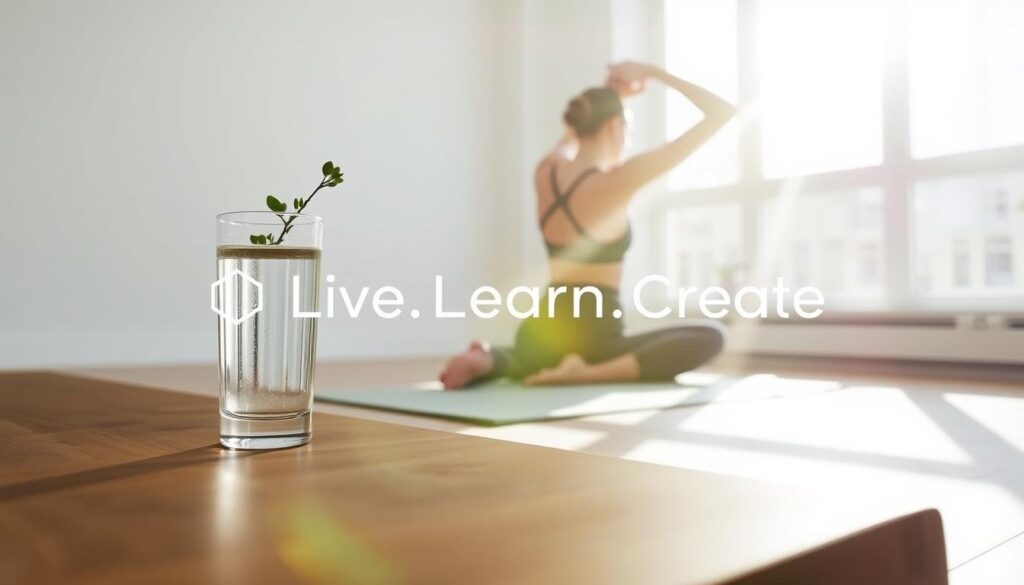
Hydration Habits for Energy
Dehydration dulls focus before you even notice thirst. University wellness protocols show that drinking 16oz of water within 30 minutes of waking boosts alertness by 20%. Try adding lemon or cucumber for electrolytes—it’s a health hack athletes and CEOs swear by.
Movement and Stretching Essentials
Your spine craves movement after hours of stillness. UChicago’s medical center recommends 5-minute mobility sequences—like cat-cow stretches or shoulder rolls—to align posture and prevent stiffness. These routines, adapted from collegiate athlete training, are now a core service in their FitChicago classes.
“Morning mobility isn’t about flexibility—it’s about creating space for your nervous system to breathe.”
Pair these practices with intuitive movement: a walk, yoga flow, or even dancing to your favorite song. It’s preventive healthcare that costs nothing but pays dividends in focus all day.
Mindful Morning Rituals for Focus
The quiet moments of dawn hold untapped power—here’s how to harness them for laser-sharp focus. At Wellness Homes of Chicago, we’ve adapted proven practices from UChicago’s research to fit even the busiest schedules. These rituals aren’t about adding tasks; they’re about transforming your morning experience.
Condensed Meditation Techniques
UChicago’s 8-week mindfulness course reveals a secret: Just 5 minutes of focused breathing can rewire your brain. Try this shortcut from their curriculum:
- Box breathing: Inhale for 4 counts, hold for 4, exhale for 4 (repeat 3x).
- Mantra focus: Pair breaths with a word like “calm” or “present.”
- Body scan: Notice tension from head to toes—no judgment, just awareness.
Rockefeller Chapel’s contemplative spaces inspired another hack: light a candle (or use sunlight) as a focal point. It’s preventive care for the mind, blending science with serenity.
Journaling for Intentionality
University wellness programs use writing to combat modern stress. These prompts anchor your day—and your life:
- “What’s one intention that would make today meaningful?”
- “What am I grateful for before the day’s demands begin?”
- “How will I nurture myself amid challenges?”
Dr. MO’s studies show this habit buffers against mental illness by reducing cortisol spikes. Keep it simple—three sentences can reshape your mindset.
“Morning mindfulness is the pause between ‘react’ and ‘respond’—where clarity lives.”
These small steps aren’t about perfection. They’re about showing up—for yourself, your focus, and the quiet wisdom of dawn.
Community and Connection in Your Routine
Chicago’s Wellness Homes prove it: belonging transforms personal habits into collective strength. When morning rituals include others—whether a walking buddy or virtual check-in—they become anchors of accountability and joy. The Wellness West initiative, which narrowed Chicago’s life expectancy gap by 12 years, shows how community rewires individual success.
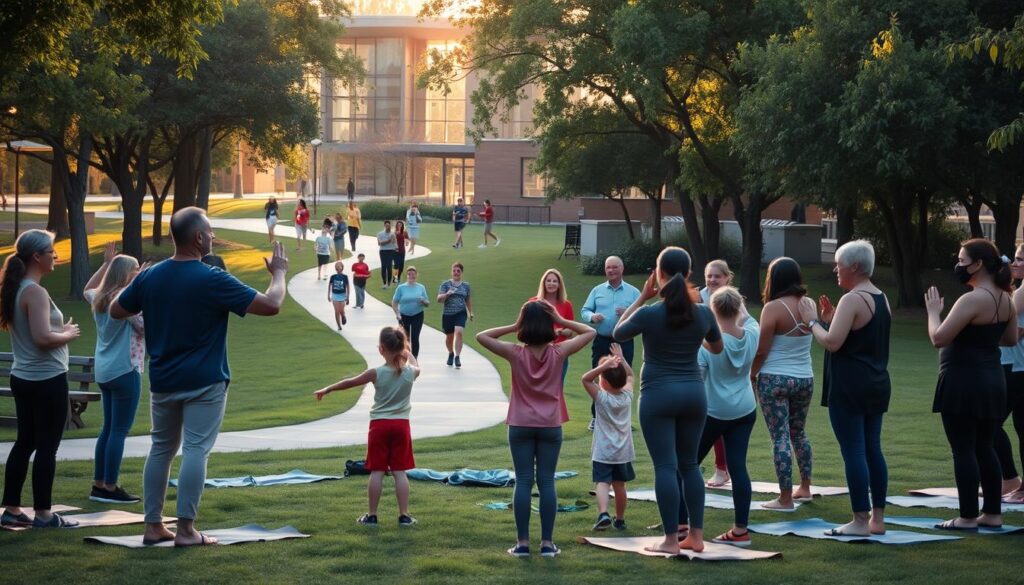
Lessons from the Wellness Home Model
Their barrier-reduction strategies work for personal routines too:
- Start small: Like their 7-day access policy, consistency beats intensity. A 2-minute check-in with a friend builds trust.
- Share spaces: Borrow their hospital-community partnership model. Swap gym sessions for park meetups.
- Design for equity: Apply Nelson Mandela’s principle: “Health cannot be a privilege.” Adapt rituals to your real life—not Instagram ideals.
Building Supportive Networks
The Healthcare Transformation Collaborative’s integrated model care approach reveals three keys:
- Layer connections: Pair hydration reminders with a text thread—wellness + community.
- Normalize help-seeking: As their organization shows, asking “Want to join my sunrise stretch?” isn’t weak—it’s wise.
- Measure warmth: Track not just steps or sleep, but smiles exchanged. Relationships fuel resilience.
“We stopped calling it self-care when we saw neighbors showing up with extra smoothies—that’s organization-level love.”
Your morning routine isn’t just about you. Like Wellness homes prove, the best model care blends personal commitment with shared purpose. When your rituals include others, they stop being tasks—and start being lifelines.
HEALTH & WELLNESS Resources to Elevate Your Routine
Transformative tools exist to deepen your morning practice—here’s how to integrate them seamlessly. Chicago’s wellness leaders like Carmen Galloway and local service providers offer bridges between intention and action.
Learning from Carmen Galloway’s Approach
Her Udemy course “Mindful Mornings” pairs neuroscience with practical steps. Try these adaptations from her Barnes & Noble publications:
- Layer journaling prompts from Wellness Home’s prevention model with her 5-minute gratitude method
- Use her “breath-to-movement” technique while waiting for your morning tea
- Sync audiobook chapters (like Dawn Wisdom) with your stretching routine
Chicago’s Living Laboratories
The Wellness West initiative proves change happens faster together. Their same-day service model offers:
- Free sunrise meditation groups at 6 community centers
- Library partnerships with Galloway’s work on reserve
- Real-time information hubs for local health equity programs
“Books give knowledge, but community turns pages into practice—that’s where healing begins.”
Start today: Blend Galloway’s research with hands-on information from Chicago’s programs. Whether it’s a 7am yoga class or her podcast between meetings, small connections create lasting clarity.
Conclusion: Crafting Your Ideal Morning
Your morning routine is more than habits—it’s the foundation for a clearer mind. Like Wellness West shows, small steps build big change. Start where you are. Use what works. Let your journey unfold one sunrise at a time.
This isn’t about perfect routines. It’s about showing up—for your focus, your community, and your life. Borrow from UChicago’s research. Adapt hospital discharge principles. Bookend days with intention.
Ready to begin? Email info@wellnesshome.org for support. Let’s build mornings that matter—today and every day. Because when we grow together, that’s true wellness. Your community and your journey await.
Explore a range of resources designed to enhance your creative skills. Whether you’re looking for inspiration or structured guidance, Carmen Galloway’s works provide valuable insights into the creative process.
Join interactive courses that challenge you to think differently and expand your creative horizons. Each course is crafted to help you develop a robust creative mindset.
FAQ
How can morning routines improve mental clarity?
Starting your day with mindful practices—like hydration, movement, and meditation—helps reset your focus. These habits create a calm foundation, reducing stress and sharpening your mind for daily challenges.
What’s the best way to incorporate movement into my morning?
Gentle stretches or a short walk can awaken your body without overwhelming you. Even 5–10 minutes of movement boosts circulation and energy, setting a positive tone for the day.
Why is community important in a morning routine?
Connecting with others—whether through shared rituals or supportive groups—strengthens accountability and motivation. A sense of belonging enhances emotional well-being, making your routine more sustainable.
Can journaling really help with focus?
Absolutely! Writing down thoughts or intentions clears mental clutter. It creates space for clarity, helping you prioritize what truly matters as you begin your day.
Where can I find trusted wellness resources?
Look for evidence-based programs, like those offered by Carmen Galloway, or local centers in Chicago. Books, courses, and community-driven models provide practical guidance for lasting habits.
Transform your home into a more peaceful and mindful sanctuary. Creating a Zen-inspired home environment is a core part of the “Live.Learn.Create” theme, focusing on peace, mindfulness, and a clutter-free space. Here is a curated list of Zen home items.
The Zen Essentials
These items are the building blocks of a calm, intentional living space.
- Candles & Scents:
- Scented Candles: Look for calming, natural scents like sandalwood, lavender, white tea, or bergamot. Choose candles made with soy or beeswax for a clean burn.
- Essential Oil Diffusers: A minimalist, sleek diffuser made of bamboo, ceramic, or glass.
- Essential Oil Sets: Look for blends specifically for relaxation, focus, or sleep.
- Incense & Burners: Natural incense sticks (e.g., palo santo, sage) with a simple, elegant burner.
The Zen Decor
This is about incorporating natural elements and simple design.
- Natural Materials:
- Wood or Bamboo Trays: For organizing candles, stones, or other small items.
- Ceramic Vases: Simple, unglazed ceramic vases in neutral colors like white, beige, or gray.
- Minimalist Art: Simple line drawings, abstract prints, or nature-inspired artwork.
- Hand-Carved Stone Coasters: Or other small stone sculptures.
- Textiles:
- Linen or Cotton Throws: A soft, neutral-colored throw blanket to add warmth.
- Jute or Sisal Rugs: These add natural texture and grounding to a space.
- Meditation Cushions (Zafu) & Mats (Zabuton): These provide comfort for meditation and add a serene touch to a room.
The Zen Ambiance
These items help create a peaceful sensory experience.
- Lighting:
- Himalayan Salt Lamps: These provide a warm, soft glow.
- Japanese-style Paper Lanterns: For a soft, diffused light source.
- Dimmable Smart Bulbs: To easily control the warmth and brightness of your lighting.
- Sound:
- Tabletop Water Fountains: The gentle sound of running water is incredibly calming.
- Wind Chimes: Made from natural materials like bamboo or metal for a soft sound.
- Bluetooth Speakers: Small, aesthetically pleasing speakers for playing ambient or meditation music.
- Nature:
- Bonsai Trees or Air Plants: Low-maintenance indoor plants that bring life and a touch of nature indoors.
- Zen Gardens: A small, tabletop sand garden with a rake and stones for a meditative ritual.
- Decorative Rocks & Pebbles: For bowls or as a decorative element.
Best Sellers https://amzn.to/3Vet1tI
New Releases https://amzn.to/4mwLjTi
Amazon Movers & Shakers https://amzn.to/4fPsZlP
Mindfulness Coloring Books https://amzn.to/4fQ0wMx
Personal Growth Coloring Books https://amzn.to/4lJeRf0
Health & Wellness https://amzn.to/4oRt24C
Zen Home Decor https://amzn.to/3VeA3i6
Zen Garden Decor https://amzn.to/4mXjT8D
Zen Garden https://amzn.to/3HQTVVB
- Mindfulness & Meditation:
- Physical Wellness:
- Habit & Productivity Tools:
- Books:
- Best-selling personal development books (Mindset, The 7 Habits of Highly Effective People, The Subtle Art of Not Giving a F*ck)
- Books on a variety of skills (coding, photography, writing.)
- Educational Gadgets:
- Smart pens that digitize notes (e.g., Rocketbook)
- Portable scanners for digitizing documents
- Laptops, tablets, and accessories
Create (Creativity, Innovation, Projects)
These products cater to your creative side, whether you are a artists, writer, or DIY enthusiasts.
- Creative Supplies:
- Adult coloring books or “paint-by-sticker” books
- Craft kits (e.g., candle-making, pottery, embroidery)
- Digital Creation Tools:
- General Inspiration & Making:

